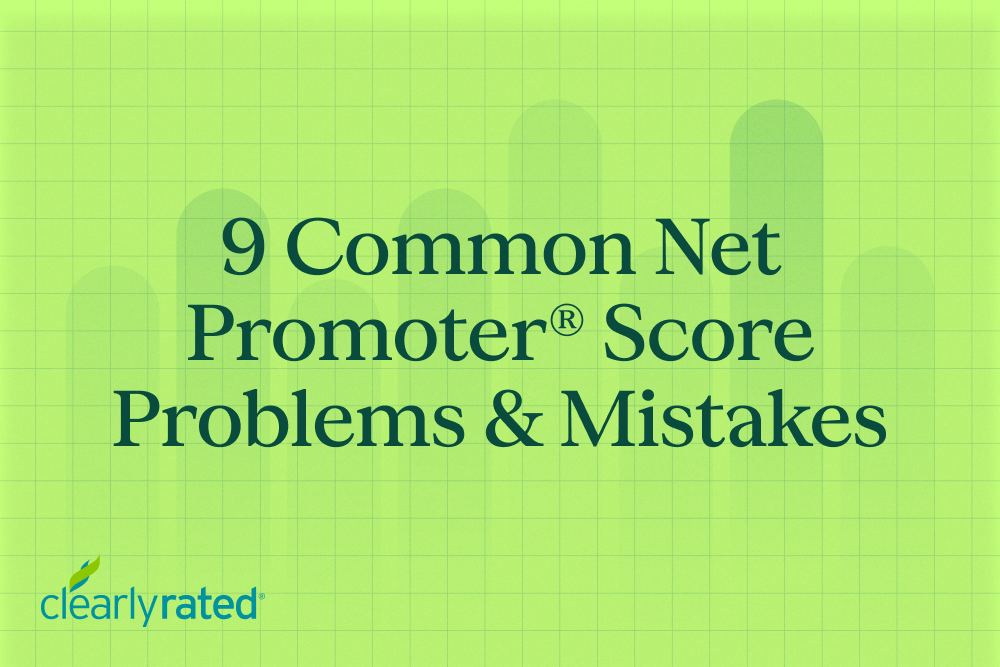Service Quality in Accounting Firms: The Relationship of Service Quality to Client Satisfaction

- Service quality in accounting firms directly impacts client satisfaction, loyalty, and retention. Clients prioritize reliability, clear communication, and consistent performance, which are key factors in driving long-term business growth.
- Strong service quality leads to higher client retention and more referrals, as clients are more likely to recommend firms that provide excellent experiences. Online reviews and NPS scores play a critical role in shaping a firm’s reputation and attracting new clients.
- Regular feedback collection through surveys and NPS tools helps accounting firms measure service quality and identify areas for improvement. By tracking client satisfaction, firms can take actionable steps to enhance their services and build stronger relationships.
- Focusing on service quality, accuracy, and personalized communication strengthens client loyalty and helps firms stand out in a competitive market. Tools like ClearlyRated provide valuable insights and benchmarking to improve service and drive client satisfaction.
Keeping clients happy takes more than accurate reports or clean audits. It comes down to authentic relationships, responsiveness, and solving problems before they grow. When people feel heard, helped, and respected, they remain loyal, and that loyalty turns into long-term value for your firm. In fact, 86% of consumers are willing to pay more for a better customer experience, even in a trust-driven field like accounting.
Clients remember how you treated them during stressful times far more than how fast you filed their returns. That’s why consistency in service, clear communication, and follow-through directly impact overall client satisfaction after every interaction. Service quality in accounting firms plays a key role in how clients rate your reliability, professionalism, and long-term value.
This guide breaks down how service quality shapes satisfaction and shows how firms can apply it in practical ways.
Why Service Quality Matters in Undifferentiated Professional Services
When every accounting firm offers similar services at similar prices, clients stop comparing the work itself. They begin focusing on how they’re treated, how clearly you communicate, and how reliable your process feels. Technical skills still matter, but service quality shapes the client’s daily experience. That experience becomes the reason they stay or leave. According to industry data, 86% of clients are willing to pay more for a better customer experience in accounting, illustrating how quality service directly influences client decisions.
Because clients use accounting firms for many different tasks, consistent service quality across all these areas builds trust. When clients feel understood and supported, they stay loyal. Service quality in accounting firms offers a clear path to stand out without competing on price alone.
The link to retention, recommendations, and reputation
Strong service quality connects directly to client retention, recommendations, and a positive reputation, making it essential for maximizing accounting firm client experience ROI. Here’s how service makes a difference:
- Retention: Clients stay when firms communicate clearly, respond quickly, and solve issues before they grow. When they trust your firm, they don’t look for alternatives, even if others offer lower prices.
- Recommendations: People share their experiences with firms that support them through stressful times and make complicated processes easy to understand. Referrals happen naturally when clients feel respected and cared for.
- Reputation: Reputation develops from every interaction clients have with your firm. Consistent, helpful service builds trust that lasts longer than marketing campaigns or fancy credentials.
Online reviews play a significant role in shaping reputation and attracting new clients. More than 85% of buyers trust online ratings when choosing firms, making positive reviews essential. Maintaining high Net Promoter Scores (NPS) helps accounting firms gather authentic testimonials that boost credibility and client trust.
Since it takes twice as many positive reviews to balance one negative one, focusing on improving accounting firm service reduces the risk of harmful feedback. Firms with a strong NPS not only keep loyal clients but also use their scores in marketing to demonstrate satisfaction and reliability. By managing service quality carefully, accounting firms create a positive cycle of retention, referrals, and a trusted public image.
Measuring Client Satisfaction in Accounting
Before choosing how to measure client satisfaction with accounting services, start by deciding what you want to learn from your clients. Are you hoping for detailed written feedback on a new service, or would a simple rating of overall service quality give you the answers you need? Defining your goal first helps you pick the right approach.
You can collect feedback with surveys or forms customized to your practice. For example, asking clients to rate a specific service on a 1-10 scale gives you precise numbers to work with.
Alternatively, you might include statements like “Using our recommended document capture tool is easy” and ask clients whether they agree or disagree. Also, don’t forget to check popular review sites like Google Reviews or Trustpilot since those platforms show what clients say about your firm publicly and highlight areas for improvement.
After setting your goals and format, consider how you’ll gather and use the data:
- Will you use survey software or share forms through email?
- Who will review and analyze the data: a team member or automated tools?
- Finally, decide how your firm will use the findings. Will you bring the team together to talk about results and plan changes?
Many tools help you collect, analyze, and apply feedback smoothly.
NPS
You’ve likely answered an NPS survey without realizing it. It asks, “How likely are you to recommend our firm to a friend or colleague?” on a scale from 0 to 10. This quickly shows how satisfied clients are and highlights where to improve.
NPS groups responses into Promoters (9-10), Passives (7-8), and Detractors (0-6). Promoters are loyal clients who refer others, while Detractors may leave or share negative feedback. Understanding these groups helps you improve client loyalty.
You can use an NPS calculator to find your firm’s score quickly. In competitive markets, retaining clients is as essential as finding new ones. Perkins & Co. in Portland used NPS data to improve service and won the “Best of Accounting” award with an 84 NPS score, boosting referrals and client loyalty.
Retention
NPS impacts client retention by revealing trust and satisfaction levels. A 2025 CapIntel survey found that 72% of investors prioritize trust when selecting advisors, even more than experience or holistic views. Breaches of trust cause clients to leave more often than poor performance.
Satisfied clients who promote your firm help with retention and attract new business through word-of-mouth. Regular NPS feedback identifies detractors early, allowing firms to fix problems before clients decide to leave. Maintaining strong client satisfaction directly supports steady growth and long-term success.
Loyalty
Customer loyalty grows through steady, respectful service that meets expectations without slipping in consistency or attention. Accounting firms that take feedback seriously and make clear improvements show clients that their input holds real value. This builds trust over time, which is much harder for competitors to break, even with lower pricing or newer tools.
Loyal clients also respond better to new service offerings and willingly refer others based on personal experience. When firms focus on improving specific touchpoints that matter most to long-term clients, they reduce churn and increase retention without chasing short-term fixes.
What Clients Actually Care About in Accounting Services
Understanding which service qualities clients value most helps your firm focus on what actually drives satisfaction.
Reliability and assurance
When clients rate their satisfaction with accounting services, reliability and assurance consistently carry the most weight. Clients want to feel confident that the information they receive is accurate and that deadlines will always be met. They care deeply about whether their accountant follows through on commitments and provides correct work the first time.
Confidence grows when clients see that their accountant knows the subject, answers questions clearly, and gives advice they can trust. Accountants who stay consistent, communicate precisely, and stand by their work tend to earn stronger client satisfaction scores. These three traits often separate average service from outstanding service in long-term client relationships.
Tangibles, responsiveness, empathy
While other factors like physical materials, speed of replies, or emotional support do play some role, they often have less impact on overall satisfaction. Tangibles such as office layout, branding, or printed reports rarely affect how clients view the core service. Similarly, quick replies or showing empathy might improve comfort, but they usually don’t outweigh trust and performance.
That doesn’t mean you should ignore these softer elements. However, if you’re aiming to improve client satisfaction, reliability and assurance should come first. When those two are weak, other efforts often feel superficial or fail to address the underlying problem.
In-depth expertise
Reliability and assurance strongly connect to client satisfaction, while tangibles, empathy, and responsiveness matter less. Many firms see that clients value accurate advice and expert help over office appearance or quick greetings.
For example, a client dealing with a challenging tax issue cares more about clear, trustworthy guidance than the firm’s lobby or phone response speed. This shows clients focus on reliable expertise when judging satisfaction.
How Accounting Firms Can Measure and Improve Service Quality
Service quality in accounting firms depends on various models that guide improvement and measurement efforts effectively. Understanding this helps firms stay competitive and responsive.
Role of trust, internal policies, and client relationships beyond SERVQUAL
Service Quality (or SERVQUAL) measures service quality using five areas:
- Tangibles
- Reliability
- Responsiveness
- Assurance
- Empathy
While the SERVQUAL model helps evaluate service, it misses key factors like trust and internal policies that profoundly shape service quality in accounting firms. Trust grows when firms follow clear policies and communicate openly, which makes clients feel confident and valued.
According to the 2024 Accounting Firm Hireability Index, 89% of small and medium-sized businesses consider their accountants as trusted advisors, highlighting the critical role of trust in client relationships.
Accounting firms that combine reliable processes with genuine care gain stronger client satisfaction and long-term success.
KPI-based satisfaction monitoring
Firms that track key performance indicators gain valuable insights into client satisfaction. These include:
- NPS, which reveals client loyalty and likelihood to recommend your firm to others
- Retention rates, which show how well you keep clients over time and build lasting relationships
- Regular feedback cycles, which allow you to spot problems early and adjust services quickly
Monitoring these KPIs consistently helps firms react faster and maintain stronger client connections. This approach drives steady improvements in service quality in accounting firms and supports sustainable growth.
Recommendations for Firms
Firms that focus on clear goals and solid processes can improve client satisfaction steadily. Acting on precise data and real feedback makes growth both measurable and achievable.
- Accuracy of work: Firms that handle every number accurately build trust and reduce client complaints. A 2024 survey showed that 84% of accounting firms reported a drop in manual errors after adopting digital tools. This focus on precision also improves employee retention, as staff take pride in producing consistent, reliable work.
- Employee training & domain expertise: Firms that build internal knowledge gain a clear edge in service delivery and accuracy. 85% of accounting firms now invest in training their staff on client experience best practices, showing a sharp industry-wide shift toward relationship-focused service. This consistent learning also boosts employee engagement, as staff develop meaningful skills that improve daily performance.
- Trust-building and personal attention: Clients rate personalized communication highly when measuring value. With 58 % of clients saying that personalized communication increases satisfaction, adding warm, friendly check‑ins strengthens relationships. This also lifts employee experience, as people enjoy making authentic connections.
- Monitoring satisfaction through informed KPIs: Firms that monitor NPS, retention, and feedback cycles gain clear insight into what matters. About 65 % of firms now use NPS or similar tools to guide client service improvements and drive loyalty. Linking data to action makes both clients and staff feel heard and valued, which boosts both employee feedback and long‑term growth.
How ClearlyRated Strengthens the Link Between Service Quality and Client Satisfaction
When accounting firms track NPS closely, they identify patterns in satisfaction levels that drive real business decisions. As a client experience and reputation management platform, ClearlyRated helps firms gather those NPS responses, custom questions, and timely follow-ups in a way that clarifies what clients truly think.
The platform also offers a Satisfaction Survey Checklist designed specifically for accounting professionals, helping teams avoid common survey mistakes and set a clear path toward better feedback outcomes. In addition, ClearlyRated supplies analytics tools and the latest benchmarks so firms can compare their NPS scores with average industry levels and track progress over time.
In fact, firms already using ClearlyRated report measurable impact on both performance and market perception. Accounting firms that leveraged ClearlyRated’s NPS platform were able to pinpoint key drivers behind shifts in satisfaction, like a 4-point dip in responsiveness, and take targeted action to improve. With the industry average NPS sitting at 38 in 2024, ClearlyRated users are positioned to outperform by closing CX gaps faster than the competition.
Fix Your Client Satisfaction Problems Now
Accounting firms lose clients quickly when they ignore service problems or fail to respond promptly to feedback. When firms take client sentiment seriously, they identify risks early and build stronger loyalty. If you want to strengthen service quality in accounting firms, start with the right feedback system.
ClearlyRated gives you a direct way to track how people feel about your accounting service, using NPS surveys, feedback tools, and benchmarking built for accounting firms. You’ll know exactly how your firm performs and where to improve.
Book a demo with ClearlyRated today to see how it works and take control of your client relationships.
FAQs
What is the relationship between service quality and customer satisfaction?
Service quality directly impacts customer satisfaction by shaping clients’ experiences and perceptions, which drives loyalty and long-term business growth through consistent, reliable service delivery.
What are the objectives of service quality and customer satisfaction?
The main objectives focus on meeting client expectations accurately, building trust, encouraging repeat business, and gathering feedback to improve processes and strengthen client relationships continually.
FAQs





.png)


%20(1).png)

.webp)
.png)






%5B1%5D.webp)







.png)










_%20The%20Ultimate%20Guide.png)





.png)




















%20in%20the%20Workplace.png)










.png)

%20and%20how%20can%20you%20increase%20it.png)
_%20A%20Step-by-Step%20Guide.png)

.png)
.png)




_.png)



%20in%202028.png)


_%20The%20Ultimate%20Guide%20(2024).png)






